unit1grammar1
高一英语Unit 1 grammar直接引语与间接引语-人教版[整理]
![高一英语Unit 1 grammar直接引语与间接引语-人教版[整理]](https://img.taocdn.com/s3/m/8c5ea96ea45177232f60a278.png)
Conclusion
1. 当主句的谓语动词是一般现在时的时候 2. 当主句的谓语动词是将来时的时候 3. 当直接引语部分带有具体的过去时间状 语时 4. 当直接引语中有以when, while引导的从 句,表示过去的时间时 5. 当直接引语是客观真理或自然现象时 6. 当引语是谚语、格言时 7. 当直接引语中有情态动词should, would, could, had better, would rather, might, must, ought to, used to, need时
Tom
said that they were listening to the pop music. Mother asked, “Have you finished your homework before you watch TV?” Mother asked me whether I had finished my homework before I watched TV.
Our teacher said to us, “Light travels faster than sound. ” Our teacher told us that light travels faster than sound. He said,“Practice makes perfect. ” He said that practice makes perfect. He said, “She must be a teacher. ” He said that she must be a teacher. The doctor said, “You'd better drink plenty of water. ” The doctor said I'd better drink plenty of water.
英语七年级上册 Unit 1 Grammar 1【牛津版】【精品课件】1
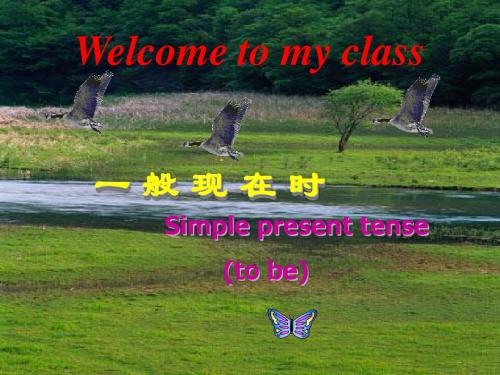
一般现在时
Simple present tense (to be)
Read the new words loudly!
eat maths walking lunchtime day always usually sometimes
-
fish walk fly every drawing weekend run often
总结:Simple present
tense of the verb ”to be”
I am a teacher.
am is are
肯定句 I am… He/she/it is… We/you/they are…
Sandy’s hair is long and black.
否定句 I am not… He/she it isn’t… We are in the classroom. We/you/they aren’t… 疑问句 Are you/we/they……? 表示目前的状态或客观事实 Is he/she/it……?
be 后+形容词
• Sandy is from China. be 后+介词短语 • We are in Class One, Grade Seven. • The girls are behind the trees.
• some exercises .
补充习题 Page5 A1
把下列句子改为否定句:
I _____ he _____ we _____ Amy_____ you _____ she _____ it _____ you _____ they _____ my parents_____
人教版高中英语必修一unit1grammar
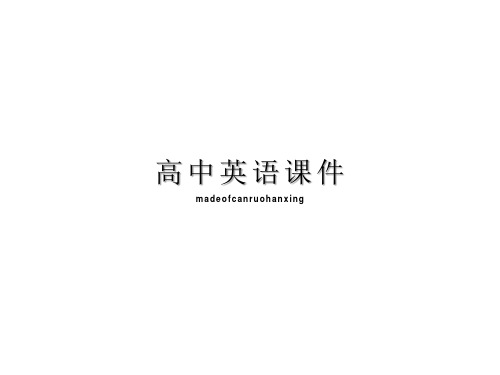
Whenyouchangeasentencefromdirects peechtoindirectspeech,yousometimes needtochangetheverbtense.Youmayal soneedtochangepronouns,timeinorder
tokeepthesamemeaning.
“Idon’tlikecomputers,”Sarahsaidtoherfriends.
Sarahsaidtoherfriends that Idon’tlike
computers. Sarah said
she
didn’t
Sarahsaidtoherfriendsthatshedidn’tlikecomput ers.
he
harvested Theyaskedhimwhenheharvestedthewheat.
选择疑问句
•用whether…or…表达,而不用if…or…,也 不用either…or… • Heasked,“DoyouspeakEnglishorFrench?”
• HeaskedmewhetherIspokeEnglishorFrenc h.
3.Tomsaid“Iwillseeyounextweek.” Tomsaidthathewouldseemethenextweek.
4.“Whywereyoulateagain?”Theteachersaidtome. TheteacheraskedmewhyIwaslateagain.
5.“Idon’tlikeswimming,”saidSarah. Sarahsaidshedidn’tlikeswimming.
一般疑问句
•间接引语用连词whether或if引导,原主句中 谓语动词said要改为asked(me/him/us等), 语序是陈述句的语序
高一英语必修一Unit1Grammar语法直接引语间接引语
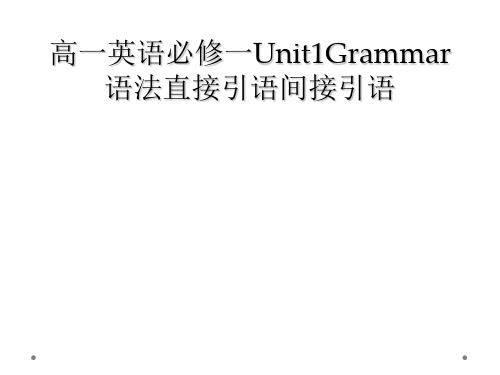
仍用一般现在时。例如: Teacher said to us:" The moon moves round
the earth." Teacher told us the moon moves round the earth. The teacher said to us : “Light travels faster
宾语从句
判断以下哪些句子属于间接引语
She said that she didn’t want to be a teacher. 间接 She said, “I don’t want to be a teacher〞.直接 He said, “ I like playing football〞. 直接 He said that he liked playing football. 间接
3. Mr Black said, “I have walked a long way this week.〞 Mr Black said that __ a long way __. A. I had walked…last week B. he had walked…that week C. I walked…last week D. he has walked…this week
〞 • 间接引语 Mum told me that I could clean my bedroom the next day . • Mr. Smith said,“He is a good worker. ’’ • Mr. Smith said that he was a good worker.
3.人称的变化
• 直接引语里的第一人称和第二人称,变间接引语时,人称要做相 应调整。例如:
必修一 Unit 1 Grammar-句子成分及基本句子结构
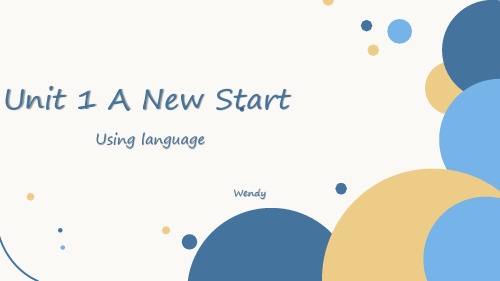
➢ e.g.
I will watch the movie.
He borrowed my key.
Time flies.
He can play basketball.
She quickly filled in the form.
句子成分
Unit 1 A new start Using language
句子成分
Unit 1 A new start Using language
表语或主语补足语 Subject complement
➢ 表语或主语补足语是接在联系动词(linking verb)之后的,用于补充说明主语所 处的状态的成分,一般由名词或形容词充当,整个句子构成所谓的“主系表”结构。 联系动词除了可以用be动词(am, is, are)构成之外,还可以用感官动词(smell, feel, taste…)充当。
c
4. I breathed deeply.
f
5. I looked at them in panic. g
6. I was embarrassed
a
7. His words made me a lot more relaxed! b
a He was friendly. b The exam made me quite nervous. c I passed him a book. d She agreed. e He wrote a long letter. f He talked loudly. g She looked after her sister patiently.
小试牛刀
造句练习
Unit 1 A new start Using language
M1 Unit 1 Grammar (1)学案
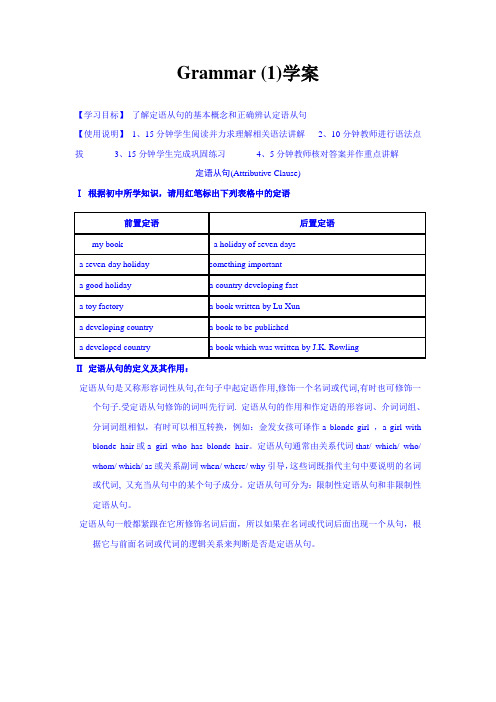
Grammar (1)学案【学习目标】了解定语从句的基本概念和正确辨认定语从句【使用说明】1、15分钟学生阅读并力求理解相关语法讲解2、10分钟教师进行语法点拔3、15分钟学生完成巩固练习4、5分钟教师核对答案并作重点讲解定语从句(Attributive Clause)Ⅰ根据初中所学知识,请用红笔标出下列表格中的定语Ⅱ定语从句的定义及其作用:定语从句是又称形容词性从句,在句子中起定语作用,修饰一个名词或代词,有时也可修饰一个句子.受定语从句修饰的词叫先行词. 定语从句的作用和作定语的形容词、介词词组、分词词组相似,有时可以相互转换,例如:金发女孩可译作a blonde girl ,a girl with blonde hair或a girl who has blonde hair。
定语从句通常由关系代词that/ which/ who/ whom/ which/ as或关系副词when/ where/ why引导,这些词既指代主句中要说明的名词或代词, 又充当从句中的某个句子成分。
定语从句可分为:限制性定语从句和非限制性定语从句。
定语从句一般都紧跟在它所修饰名词后面,所以如果在名词或代词后面出现一个从句,根据它与前面名词或代词的逻辑关系来判断是否是定语从句。
找出下列句中的定语从句;分析定语从句三要素1. You are the right man whom we are looking for.2. I’ve spent all the money that was given by my parents.3. I will never forget the day when I joined the party.4. This is the factory where the machines are made.Ⅳ 关系代词的用法:Ⅴ 课堂练习 12关系词 3关系词在从句中充当成分relative pron. (as sub. ,obj. ,pred.)(that 指人或物 / which 指物 / who(m) 指人/ whose)relative adv. (as adverbial)(when / where / why)Ⅲ 定语从句的必备三要素1 找出下列各句中的定语从句,并分析其先行词:1 The fan that you want is on the desk.2 The woman you saw in the park is our geography teacher.3 Here is the girl whose brother works in this shop.4 That’s the child whose drawing we were looking at just now.5 This is the boy whose sister is a famous singer.2 把下列每对句子合并成含有定语从句的主从复合句1. The man is in the next room. He brought our textbooks here yesterday.2. The magazine is mine. He has taken it away.3. The students will not pass the exam. They don’t study hard.4. The letter is from my sister. I received it yesterday.5. The play was wonderful. We saw it last night.6. The train was late. It was going to Nanning.。
Unit1Grammar课件牛津译林版英语九年级上册
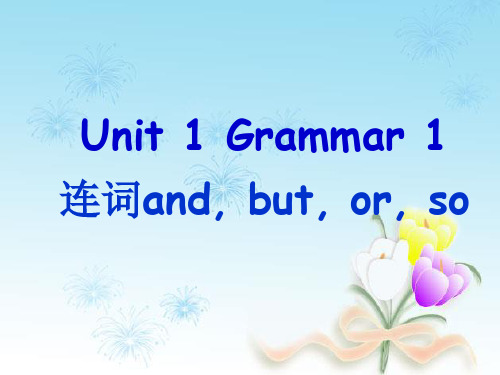
get any milk.
*16. Excuse me, _b_u_t__ could you show me
how to use the machine?
both either neither none all any的用法
I am active and energetic, and I love working with people.
Let’s join the two sentences together.
1. He doesn’t like to talk much. 2. His work shouts!
(but) join two different ideas
◆ We use ‘so’ to express the result of something. Attention: If the two subjects and verbs are the same, we do not need to repeat the first ones when we join ideas together with and, but and or .
两者
三者或三者以上
任何一个
either
any
都
both
all
任何一个都不
neither
none
作不定代词 either/both/neither/any/ all/ of sth. (sb.) 名词复数
both of us neither of the twins either of the two answers
8. — Have you seen Tom and Mary? —No, I haven seen _n_e_it_h_e_r__ of them.
牛津译林版八年级英语上Unit1 Grammar1课件

不规则变法
little far old
Complete the table .
adjective funny
good happy
comparative
funnier
superlative
funniest best happiest
better
happier
interesting
large
more interesting most interesting larger smarter redder largest smartest reddest
worst worse bad 最差的 更差的 Which flower is ______, worse this one or that one ? That flower is ________ the ,更糟的 worse adj. 最差的,最糟的 worst n. 高,高度 height /ai/ n. 重量 weight /ei/ n. 秒(=second) Sec. competition n. 竞赛,比赛,竞争 v./n. 测试,考查 test n. 游泳者 swimmer
1. We use comparatives + than to compare two people or things. e.g. Tom is cleverer than Daniel. This film is more interesting than that one.
We add -er / -est after short adjectives. We use more/ most before long adjectives.
zxxk
How tall the woman is!
- 1、下载文档前请自行甄别文档内容的完整性,平台不提供额外的编辑、内容补充、找答案等附加服务。
- 2、"仅部分预览"的文档,不可在线预览部分如存在完整性等问题,可反馈申请退款(可完整预览的文档不适用该条件!)。
- 3、如文档侵犯您的权益,请联系客服反馈,我们会尽快为您处理(人工客服工作时间:9:00-18:30)。
foery formal
often used to ask permission could from strangers, old people,
teachers and bosses used in formal situations to ask may if it is OK to do sth
S: Mum, _c_o__u_l_d__ I use your computer? I want to search
for some information.
M: Sorry, you __c_a_n__’t__ use it now. I am busy. And I think youo_u__g_h_t_t_o____ spend more time on your homework.
—Yes, you may. 可以。
b) —Might I have a look at your new plan?
我可以看一下你的新计划吗?
— No, you may not. 不,不行。
Fill in the blanks
• This morning ×××was late. If he wanted to come into the classroom, he should say, “_M__a_y__I _c_o_m__e_i_n_?__”
S: _M__u_s_t_ I do it now? M: Well, you n__e_e__d_n_’_t. After lunch, you m__a__y_/_chaanve a rest.
a) —Could I use your computer, please? 请问,我可以用一下你的电脑吗?
—Yes, you can. 可以。
b) —Could I hand in our homework later, Mr Lin? 林老师,我可以稍后交作业吗?
—No, you can’t. 不,不行。
No, you _m__a_y__n_o_t
(couldn’t, may not).
__C_a_n____ (Might,
Can) I borrow your boots?
Yes, you
_c_a__n___ (can,
may).
After borrowing the things he needs, Simon speaks to his mum. Read the dialogue and fill in the blanks with may, can(not), must(not), needn’t, ought to.
2. may与might may也可以用来征求对方意见,意为 “可以”,相当于could,用法也比 can更正式,更礼貌,一般用于向陌生 人或所尊敬的人请求许可。如:
a) —May I ask you a question? 我可以问你一个问题吗?
—Yes, please. 可以,请问。
b) —May I come in, Mr Wu? 吴老师,我可以进来吗?
—Of course. 当然可以。
b) —Can I have some milk, Mum? 妈妈,我可以喝点牛奶吗?
could 是can的过去式,在口语中,could 常 用来代替 can向对方更委婉地提出请求,用 法上比can正式,可以用于向老师或长辈提 出请求,这时could不表示过去,回答一般 还是用can。如:
Can you show us what the two words mean? Could I use your dictionary?
Can I use your dictionary?
From the words above, we can know that we can use ‘can’, ‘could’, ‘may’, ‘might’ to talk about permission, and these four words have different degrees of formality.
—No, you can’t . 不行。
might是may的过去式,它也可以用来 表示征求对方意见,不过很少用。might 在语气上比may更婉转,但不如may表 现得那么自信,这时might不表示过去时 态,肯定回答时通常用may。如:
a) —Might I join you? 我可以加入你们吗?
Unit 1 Life on Mars Grammar 1
can, could, may, might 都可以用来表 示请求或给予许可。但 用法上有一些区别:
1. can与could can 常用于口语中,表示非正式的 请求,请求对象一般是家人或朋友。 如:
a) —Can I borrow your bike, Simon? 西蒙,我可以借一下你的自行车 吗?
• If I want to borrow a dictionary from a student, I should say, “____C__a_n__I_u_s_e__y_o_u_r_________ d_ic_t_i_o_n_a_r_y_?____”.
Now If a student wants to borrow a book from me, what should he/she say? ——Could I use your book, Mr Zhao? ——Yes, you ___c_a_n_____.
might very formal but seldom used
Dad, c_o__u_l_d
(may, could) I take your camera?
Yes, you _c_a_n_
(can, may).
_M__a_y___ (May, Can)
I borrow this helmet?
